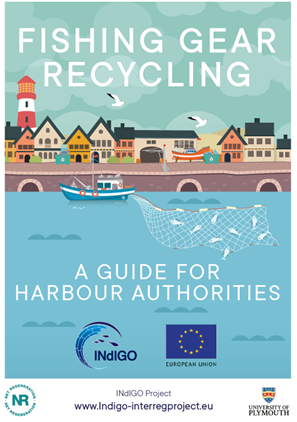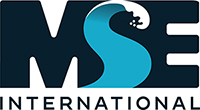Fishing Gear Recycling Guide for ports and harbours published by INdIGO project

The INdIGO European project is working to develop biodegradable fishing gear and to improve the recycling of fishing gear at the end of its life. The project has recently launched its Fishing Gear Recycling publication; a guide for ports and harbour authorities which details the benefits of recycling, common constraints, the recyclers perspective and the steps for best practice recycling. The guide was produced by the University of Plymouth who are a key partner in this important project.
The new guide clearly defines the benefits and offers guidance in setting up fishing gear recycling systems in harbours and ports which encourages the proper disposal of waste fishing gear and reduces the risk of marine pollution and the detrimental effects of ghost fishing on marine sea life. Not only does this benefit the ocean by reducing possible plastic fishing waste escaping into the environment but it also links to how many ports and harbours are looking into their own broader sustainability goals and the fishing industries practices, and waste management is a good place to start.
This new Ports and Harbours guide advocates the use of recycled plastics to significantly reduce the carbon footprint of products and encourages fishers and harbours to work together to develop a circular economy to manage resources more carefully and address climate change. The guide encourages a collaborative effort with ports and harbours working with fishers, net setters, fish producing organisations, local authorities, recyclers and researchers to keep plastics out of the ocean and circulating in the economy.
To assist ports and harbours, the guide offers ‘best practice’ suggestions and ‘check lists’ for fishing gear recycling including, setting targets, reviewing waste streams, improved harbour housekeeping, dedicated collection receptacles and good signage to reduce contamination. In addition the guide encourages raising awareness amongst staff and fishers as well as communication and collaboration with neighbouring harbours to share facilities and coordinate collections.
Importantly, the guide highlights the work of the Net Regeneration Scheme, run by project partner Odyssey Innovation, which is already working with over 40 fishing communities, ports and harbours to recycle end of life fishing gear as well as with charities and beach clean groups to recover lost fishing gear and plastics from the coastline. The scheme offers free recycling, an excellent alternative to sending gear to landfill, incineration or abandonment at sea or on beaches. By removing cost barriers, the scheme also supports fishermen, ports and harbours to collect lost fishing gear and marine plastic waste. Ports and harbours wishing to join the Net Regeneration Scheme should contact support@odysseyinnovation.com for more information.
Further details can be found here including a number of instructional videos regarding the recycling of fishing gear, preparation of gill nets for recycling and the preparation of plastics for recycling.


